#QuietQuitting Sounds Like Capitalists Complaining About Their Waning Exploitation.

#QuietQuitting sounds like capitalists complaining about their waning exploitation.
More Posts from Sentimentalrobots and Others
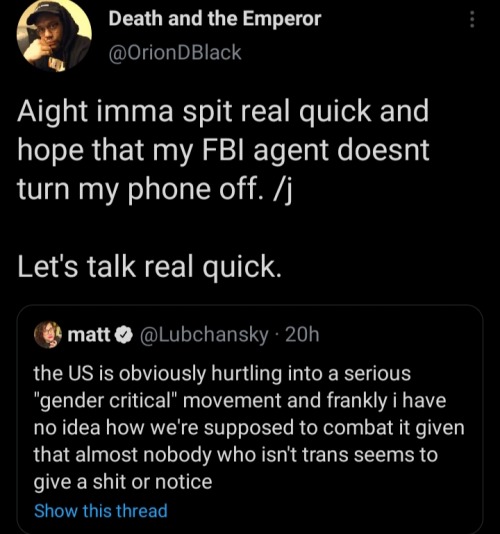
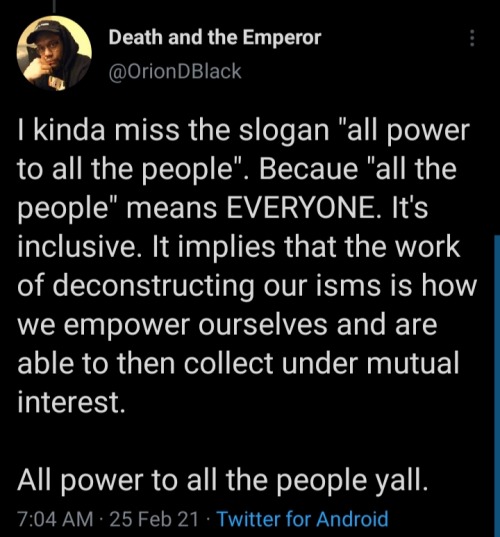
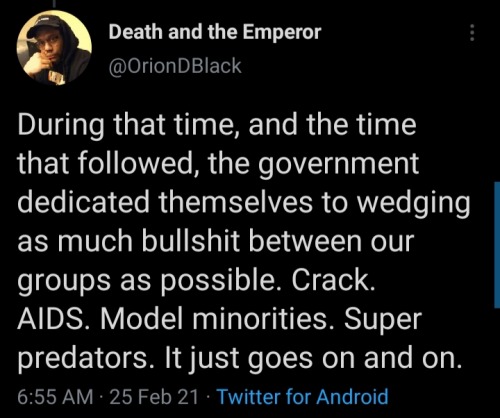
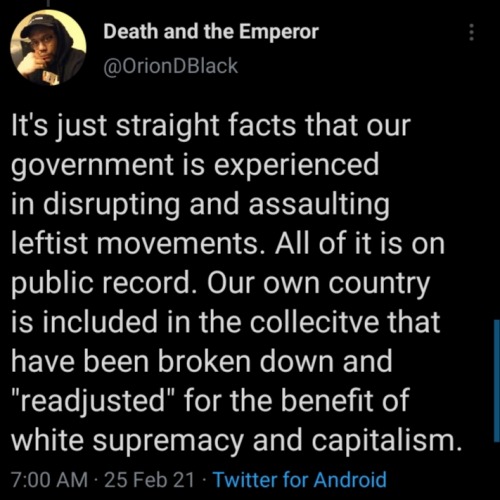


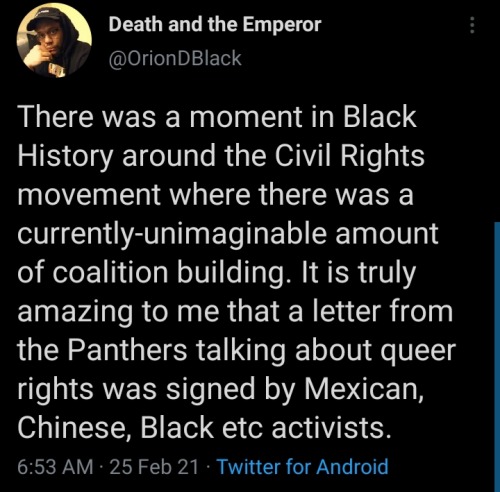

People on this site will put together polls like "The Banach-Tarski Paradox versus Camembert Cheese", then act like the results prove that they're surrounded by idiots.
LITERALLY the most Lynch thing i’ve seen

I wanted to share this cool picture I found in the ebook version of Dawn, at the end of the book.
"Butler with authors Tananarive Due, Jewelle Gomez (standing), Samuel R. Delany, and Steven Barnes (sitting) at Clark Atlanta University’s conference for African American science fiction writers—the first of its kind—in 1997."
instagram.com/tananarivedue
instagram.com/vampyrevamp
------
I love this picture of Octavia Butler with fellow Black Sci Fi writers in 1997! (I turned 7 years old that year) I wish I was older at the time so I could have been there 😊 It would have been amazing to see these five in the 90s, just writing sci fi and making a way for future Black sci fi writers.
So much talent in one image, wow.

I've finally finished this one! An untidy, yet cosy fantasy/sci-fi bookshop, with a stack of old paperbacks on the counter.
Prints available here
The Spanish surnames of many Filipinos have often misled foreigners here and abroad, who are unaware of the decree on the adoption of surnames issued by Governor-General Narciso Clavería in 1849. Until quite recently in the United States, the Filipinos were classified in demographic statistics as a “Spanish-speaking minority,” along with Puerto Ricans, Cubans, Mexicans, and other nationals of the Central or South American republics. The Philippines, as is well known, was a Spanish colony when Spain was mistress of empires in the Western Hemisphere; but the Americans were “hispanized” demographically, culturally, and linguistically, in a way the Philippines never was. Yet the Spanish surnames of the Filipinos today—García, Gómez, Gutiérrez, Fernández—seem to confirm the impression of the American statistician, as well as of the American tourist, that the Philippines is just another Mexico in Asia. Nor is this misunderstanding confined to the United States; most Spaniards still tend to think of “las Islas Filipinas” as a country united to them through the language of Cervantes, and they catalogue Philippine studies under “Hispano-America.” The fact is that after nearly three-and-a-half centuries of Spanish rule probably not more than one Filipino in ten spoke Spanish, and today scarcely one in fifty does. Still the illusion lives on, thanks in large part to these surnames, which apparently reflect descent from ancient Peninsular forbears, but in reality often date back no farther than this decree of 1849.
Somehow overlooked, this decree, with the Catálogo Alfabético de Apellidos which accompanied it, accounts for another curiousity which often intrigues both Filipinos and foreign visitors alike, namely, that there are towns in which all the surnames of the people begin with the same letter. This is easily verifiable today in many parts of the country. For example, in the Bikol region, the entire alphabet is laid out like a garland over the provinces of Albay, Sorsogon, and Catanduanes which in 1849 belonged to the single jurisdiction of Albay. Beginning with A at the provincial capital, the letters B and C mark the towns along the coast beyond Tabaco to Tiwi. We return and trace along the coast of Sorsogon the letters E to L; then starting down the Iraya Valley at Daraga with M, we stop with S to Polangui and Libon, and finish the alphabet with a quick tour around the island of Catan-duanes. Today’s lists of municipal officials, memorials to local heroes, even business or telephone directories, also show that towns where family names begin with a single letter are not uncommon. In as, for example, the letter R is so prevalent that besides the Roas, Reburianos, Rebajantes, etc., some claim with tongue in cheek that the town also produced Romuáldez, Rizal, and Roosevelt!
Excerpt from the 1973 introduction to Catálogo de Alfabético de Apellidos by Domingo Abella

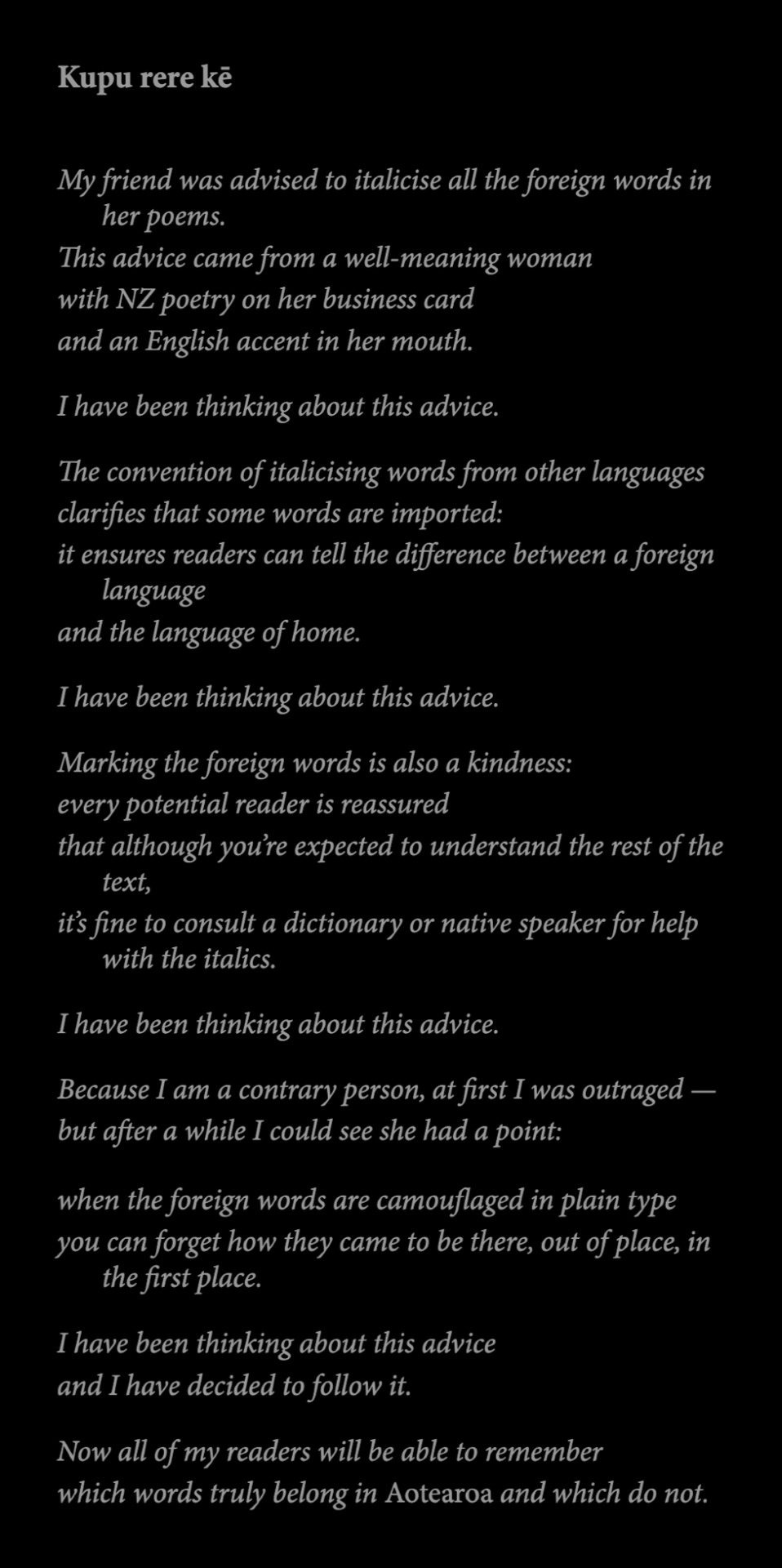
Alice Te Punga Somerville, Always Italicise: How to Write While Colonised - Kupu rere kē


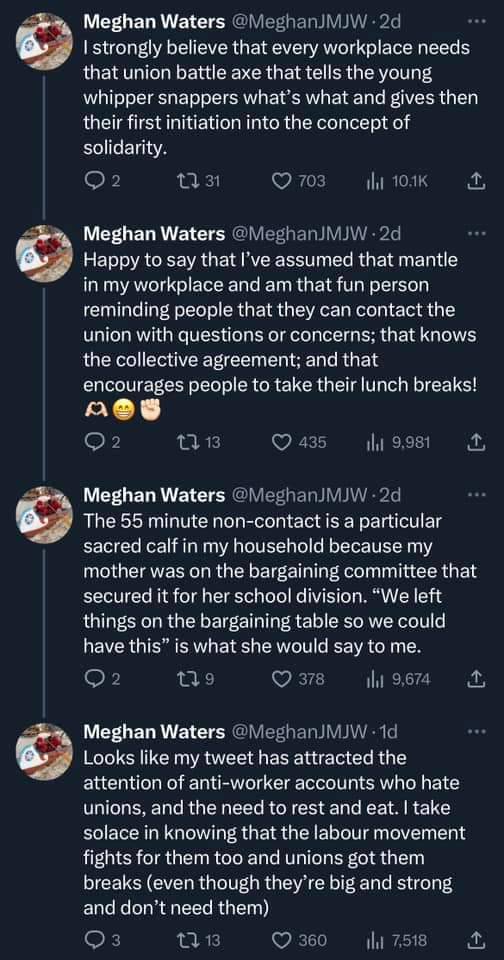

-
 serendipity-sunbird liked this · 3 weeks ago
serendipity-sunbird liked this · 3 weeks ago -
 ynnubdam liked this · 4 weeks ago
ynnubdam liked this · 4 weeks ago -
 arewealloststars liked this · 1 month ago
arewealloststars liked this · 1 month ago -
 dafa-hojao liked this · 1 month ago
dafa-hojao liked this · 1 month ago -
 lida1122 liked this · 1 month ago
lida1122 liked this · 1 month ago -
 swhhdr-wthhr liked this · 2 months ago
swhhdr-wthhr liked this · 2 months ago -
 yenoodlethings reblogged this · 2 months ago
yenoodlethings reblogged this · 2 months ago -
 botticellis-primavera liked this · 2 months ago
botticellis-primavera liked this · 2 months ago -
 i-may-be-somebody-hidden reblogged this · 2 months ago
i-may-be-somebody-hidden reblogged this · 2 months ago -
 oftwodarkmoons reblogged this · 2 months ago
oftwodarkmoons reblogged this · 2 months ago -
 haphira reblogged this · 2 months ago
haphira reblogged this · 2 months ago -
 haphira liked this · 2 months ago
haphira liked this · 2 months ago -
 dapperenby13 reblogged this · 2 months ago
dapperenby13 reblogged this · 2 months ago -
 dapperenby13 liked this · 2 months ago
dapperenby13 liked this · 2 months ago -
 forsakenqueer reblogged this · 2 months ago
forsakenqueer reblogged this · 2 months ago -
 mallymun reblogged this · 2 months ago
mallymun reblogged this · 2 months ago -
 roboj0e liked this · 2 months ago
roboj0e liked this · 2 months ago -
 leafweaverryn reblogged this · 2 months ago
leafweaverryn reblogged this · 2 months ago -
 leafweaverryn liked this · 2 months ago
leafweaverryn liked this · 2 months ago -
 sunnybigtruck reblogged this · 2 months ago
sunnybigtruck reblogged this · 2 months ago -
 sunnybigtruck liked this · 2 months ago
sunnybigtruck liked this · 2 months ago -
 plotbunnypettingzoo reblogged this · 2 months ago
plotbunnypettingzoo reblogged this · 2 months ago -
 the-goddess-of-sleep reblogged this · 2 months ago
the-goddess-of-sleep reblogged this · 2 months ago -
 the-goddess-of-sleep liked this · 2 months ago
the-goddess-of-sleep liked this · 2 months ago -
 squarehere reblogged this · 2 months ago
squarehere reblogged this · 2 months ago -
 gibbythesecond reblogged this · 2 months ago
gibbythesecond reblogged this · 2 months ago -
 gibbythesecond liked this · 2 months ago
gibbythesecond liked this · 2 months ago -
 yirus reblogged this · 3 months ago
yirus reblogged this · 3 months ago -
 fogandfireflies liked this · 3 months ago
fogandfireflies liked this · 3 months ago -
 forbidden-cookie liked this · 4 months ago
forbidden-cookie liked this · 4 months ago -
 altbismodern liked this · 5 months ago
altbismodern liked this · 5 months ago -
 spqr7512 liked this · 5 months ago
spqr7512 liked this · 5 months ago -
 anxiousmercy liked this · 5 months ago
anxiousmercy liked this · 5 months ago -
 pro-crastinator14 reblogged this · 5 months ago
pro-crastinator14 reblogged this · 5 months ago -
 pro-crastinator14 liked this · 5 months ago
pro-crastinator14 liked this · 5 months ago -
 anonannenome liked this · 6 months ago
anonannenome liked this · 6 months ago -
 lily-of-rabanastre liked this · 6 months ago
lily-of-rabanastre liked this · 6 months ago -
 craftyrebelwitch liked this · 6 months ago
craftyrebelwitch liked this · 6 months ago -
 annita89v9ul06h liked this · 7 months ago
annita89v9ul06h liked this · 7 months ago -
 influencethislj reblogged this · 7 months ago
influencethislj reblogged this · 7 months ago -
 influencethislj liked this · 7 months ago
influencethislj liked this · 7 months ago -
 startleddust reblogged this · 7 months ago
startleddust reblogged this · 7 months ago -
 megacharizardx99 liked this · 7 months ago
megacharizardx99 liked this · 7 months ago -
 mon-remonda reblogged this · 7 months ago
mon-remonda reblogged this · 7 months ago -
 mon-remonda liked this · 7 months ago
mon-remonda liked this · 7 months ago -
 nightmarechamillian liked this · 7 months ago
nightmarechamillian liked this · 7 months ago -
 thisistotesnotspam-heart liked this · 7 months ago
thisistotesnotspam-heart liked this · 7 months ago -
 afanforyourfiction reblogged this · 7 months ago
afanforyourfiction reblogged this · 7 months ago -
 pieassassin reblogged this · 7 months ago
pieassassin reblogged this · 7 months ago -
 pieassassin liked this · 7 months ago
pieassassin liked this · 7 months ago

General interest @culturesinglarityGay shit and lots of dicks @demon-core-incidentDeep Space Nine relevance @temba-his-arms-wideHorny men's tailoring @captaindadsmenshosiery Pfp courtesy of @anonymous-leemur
207 posts